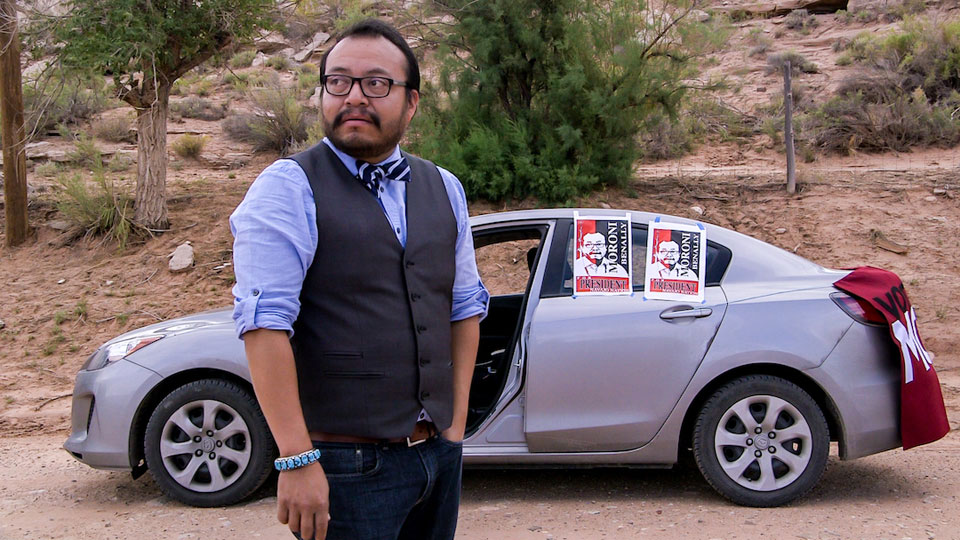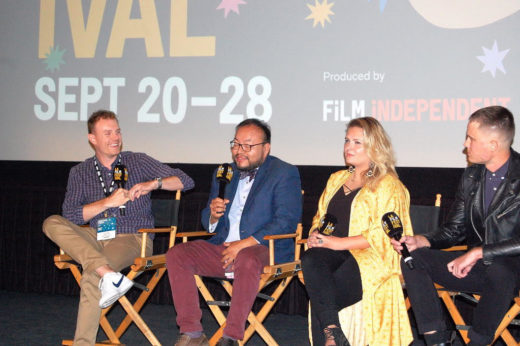
LOS ANGELES—I stumbled upon Moroni for President purely by chance and am I glad that I did! It just so happened to fit into my schedule covering the LA Film Festival so I popped into the ArcLight Theatre, not knowing what I’d see. Based on its name, I thought it might be a satire based on Trump about a moron running for the White House. But to paraphrase an old saying, don’t judge a film by its title. It turned out that Finnish filmmaker Saila Huusko and Dutch co-director Jaspen Rischen’s directorial debut was actually a documentary about someone named Moroni Benally, who indeed was actually running for president.
But not of the U.S.—rather of the Navajo Nation, a tribal government with reservation territory straddling three states, where more than a third of a million residents live. I loved this nonfiction film for a number of reasons. First of all, it reported on America’s largest Native nation, something we rarely if ever hear about on MSM. When Ted Turner invented CNN in 1980 his concept of a 24/7 news channel was to cover the world. Today, what passes for cable “news” has devolved into covering the same old one or two stories daily, over and over again, often by talking heads who know so little about so much, spewing speculation and disinformation ad nauseam, the repetition only broken by commercials advertising disgusting body parts products that we have to pay to watch. This Trump-all-the-time coverage is a business model that generally has astoundingly few viewers largely because it precludes actual reportage about, you know, the world at large.
So Moroni for President is a breath of fresh air because it shines a light on America’s Indigenous people with an insider’s view (and no ads!). But this doc is also worth seeing because its eponymous real-life subject is a unique individual. The youthful, bearded Moroni Benally attended Stanford, became a university professor at a college in Washington State, and visually stands out in a crowd of candidates because he is the only Navajo presidential aspirant who, like Senator Paul Simon, wears a bowtie (cowboy hats and wrangler jeans are more de rigueur among the tribal contenders).
Moroni is named after the Mormon prophet of the sane name who supposedly lived in the Americas around the fifth century, although I don’t recall this ever explained onscreen. (Mormons believe Jesus visited what we now call America and its aboriginal inhabitants long before Christopher Columbus sailed the ocean blue in 1492.)
To make matters further complicated, the titular Moroni is gay, which puts him in opposition to the teachings of the Church of Jesus Christ and Latter Day Saints, as the Mormons are officially called. As such, Moroni for President also becomes a look at the LGTBQ community and Mormonism, as well as vis-à-vis the Navajo Nation, which likewise eschews gays. Other Navajo homosexuals, such tribal government staffer Zach George, are covered at length in this complex, singular documentary.

Moroni’s campaign platform also distinguishes him from the “old guard” and other office seekers. Like a latter day prophet (the Latter Day’s Nephite Moroni was a military commander), Moroni Benally preaches “decolonization” and “sovereignty” to restore autonomy and self-determination to an impoverished, abused Navajo nation where some live to this day without running water. As someone who previously covered the Nuclear Free and Independent Pacific and Hawaiian Sovereignty movements for Radio Australia, Radio New Zealand, Honolulu Weekly, etc., this was music to my ears.
I wish the European filmmakers had focused more on Moroni’s anti-colonial message, which is covered in their film more in passing. Otherwise, Moroni for President is an excellent first-time documentary about a conflicted character who tries to reconcile his sexual orientation with his religion, tribe and family, while struggling to do the right thing for his people. At only 81 minutes, the doc never drags (well, except perhaps for the drag queen ball Moroni organizes).
Throughout the race, Moroni remains affable, if sometimes discouraged and disappointed. He seems like a genuinely nice guy who means well, unlike so many U.S. politicians. I hope someday Benally will win the presidency of the Navajo Nation in order to further the battle for tribal independence and justice. This nonfiction chronicle is required viewing for those interested in Indigenous issues, LGBTQ subjects, and politics in general.
As Hawaiian activists say: “Onipa’a!” – stay steadfast!
For more info see: www.LAFilmfest.com.












Comments